 |
 |
Unidentified snake Quiz: |
| Author | Message |
|
David Bird Forum Specialist Joined: 17 Feb 2003 No. of posts: 515 View other posts by David Bird |
Posted: 28 Sep 2003 The following attached picture is of a snake that was given to me today by someone who was given it in the week by the local police. It had fallen out of a blind when the shopkeeper was closing up in a furniture shop in the week in Southampton. It has vertical pupils and when frightened curls up and moves its coils to make a hissing/rasping sound like a Cerastes or Echis it also opens its mouth to show the black inside and strikes out. Any body any views on what they think it may be, it is about 15 ins long. I think I do know what it is but the markings on the head are not quite correct but I have not seen many of this species in life before. 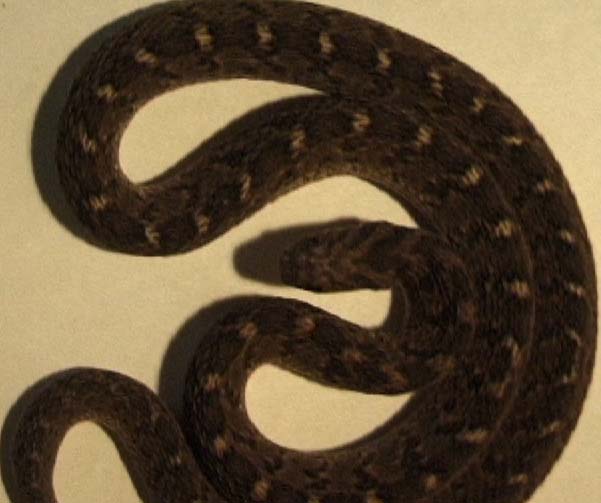 British Herpetological Society Librarian and member of B.H.S Conservation Committee. Self employed Herpetological Consultant and Field Worker. |
|
Caleb Forum Coordinator Joined: 17 Feb 2003 No. of posts: 448 View other posts by Caleb |
Posted: 29 Sep 2003 It's not an Egg-eating snake is it? I've heard that they move their coils in the way that you describe, and I think they have vertical pupils. It's a very long time since I've seen one, though- I've not heard of any in the pet trade for ages. |
|
Jim Foster Member Joined: 24 Jul 2003 No. of posts: 19 View other posts by Jim Foster |
Posted: 29 Sep 2003 Dave Be careful! It sounds very like Echis from your description. I used to find a lot of them in south India, and they do exactly as you've described. The noise they make is impressive for a small snake. They often hold their ground and strike repeatedly when cornered. The scales really are incredibly well keeled. The photo you posted didn't come out too well, and am not sure about id. Echis are very variable, and I'm not up to date with the taxonomy but sure someone like Wolfgang W is. I have never seen Cerastes in the wild. Can you find out where it is likely to have come from by asking the shop about recent imports? This might help with id. Jim Jim Foster. Reptile & amphibian specialist, Natural England. |
|
Gemma Fairchild Krag Committee Joined: 14 Feb 2003 No. of posts: 193 View other posts by Gemma Fairchild |
Posted: 29 Sep 2003 Dave, hope you don't mind, but I did enhance the pic last night to take a better look, I think this version is clearer, (use image>adjust>levels in photoshop)
----RAUK e-Forum---- 
|
|
Gemma Fairchild Krag Committee Joined: 14 Feb 2003 No. of posts: 193 View other posts by Gemma Fairchild |
Posted: 29 Sep 2003 this one might be out for background colour, but does show the markings quite well, ----RAUK e-Forum---- 
|
|
Matt Wilson Member Joined: 25 May 2003 No. of posts: 38 View other posts by Matt Wilson |
Posted: 29 Sep 2003 Dave, Looks like a egg-eater of some kind. Most certainly not an Echis, but if in doubt might be worth looking for fangs or letting it bite an object and look for venom. Have you tried feeding it yet?, might be be worth giving it an egg or mice and seeing if it is used to a captive feeding setup. It may well be wild caught escaped animal that may well have been forced fed. Matthew Wilson |
|
Matt Wilson Member Joined: 25 May 2003 No. of posts: 38 View other posts by Matt Wilson |
Posted: 29 Sep 2003 Dave, Just found a pic and your snake is African egg-eater (Dasypeltis scabra), the head markings are exactly the same and they grow to about 80cm, and are found along with Carpet vipers. These are the only species that i have seen in captivity in Britain as well, it should feed if you get temps correct for a species native to most of Africa south of the Sahara. My field guide also states the species opens mouth to show black, a typical egg-eater you have there. Might be worth keeping such an interested species, since you told me you got rid of your Ophisaurus. Matthew Wilson |
|
David Bird Forum Specialist Joined: 17 Feb 2003 No. of posts: 515 View other posts by David Bird |
Posted: 29 Sep 2003 Thanks a lot everyone. I did think it was the common egg eating snake Dasypeltis scabra scabra which is a mimic of the saw scaled viper, I have had Echis at Poole Aquarium so felt sure it was not that but do know they are variable over the whole range where they occur.It did look similar to the Lyre snakes Trimorphodon sp.[/I from Mexico and California but this only live is rocky areas in the crevices and flakes of rocks and it does a rattler impression by vibrating the tail rather than the scale rasping. We did not receive the details of the shop so could not ask if any recent deliveries were from foreign parts or even neighbouring shops, this is always the first thing I would ask if dealing with the Police myself. I may not be able to keep the snake myself as there is sure to be problems feeding it especially through the winter, it looks too small to be able to cope with the Quails eggs I got for it today at the supermarket but will ask around to see if anyone has Zebra Finch eggs or something of a similar size. Thanks for the response, I hope it shows what may turn up at any time. David Bird British Herpetological Society Librarian and member of B.H.S Conservation Committee. Self employed Herpetological Consultant and Field Worker. |
|
-LAF Senior Member Joined: 03 Apr 2003 No. of posts: 317 View other posts by -LAF |
Posted: 29 Sep 2003 Yup, Dasypeltis. Lee Fairclough |
|
Jim Foster Member Joined: 24 Jul 2003 No. of posts: 19 View other posts by Jim Foster |
Posted: 30 Sep 2003 Doh! Fooled by an egg-eating snake. Very sneaky, Dave! As you say, it's interesting what turns up. I was called to a dockyard once after the men unloading a container from distant shores were scared off by a reportedly 5 ft cobra, hissing and striking. When I got there it took ages for me to clear out the container (they refused to help) and at the very back was a young Elaphe taeniura, about 18ins long! Jim Foster. Reptile & amphibian specialist, Natural England. |
|
Tony Phelps Forum Specialist Joined: 09 Mar 2003 No. of posts: 575 View other posts by Tony Phelps |
Posted: 03 Oct 2003 Hi all, Just back from Rome today. Don't think snake is Dasypeltis scabra, looks more like D.medici, could be wrong scabra is quite variable but the spacing of the light dorsal markings and lateral bars suggest medici to me. Tony |
|
Egg-eater Member Joined: 14 Oct 2003 No. of posts: 2 View other posts by Egg-eater |
Posted: 14 Oct 2003 I have Dasypeltis scabra and atra at home (including recent hatchlings of the latter). I agree with Tony that the light markings on the back look more like medici, though the image is not that clear and scabra markings can be quite variable. If it proves to be a female scabra, I have two lonely males... Re. feeding, Chinese painted quail eggs are quite easy to come by (check large pet stores/aviaries) and have a long breeding season. These are much smaller than the edible quail eggs. I have access to finch eggs, but need all I can get at the moment to feed my new hatchlings (more due to hatch next month). Cockatiels also lay unwanted eggs through the winter, and these are quite small. Good luck. (P.S. just studied the enhanced images and now think probably scabra - rhombic markings on flanks.) Patrick |
|
David Bird Forum Specialist Joined: 17 Feb 2003 No. of posts: 515 View other posts by David Bird |
Posted: 22 Oct 2003 I have taken a few pictures in natural light when it was sunny of the Egg eating snake. The snake has fed on 6 canary and finch eggs that were from an outside aviary and felt very light so may have been dehydrated. 2 nights later it fed on 4 of the same and managed a supermarket fresh quails egg which was far larger. I have since found a person in my nearest town who breeds Japanese Painted Quail and has kindly given me a couple of batches together with a Budgies egg and a couple of fresh finch eggs which have all going down well 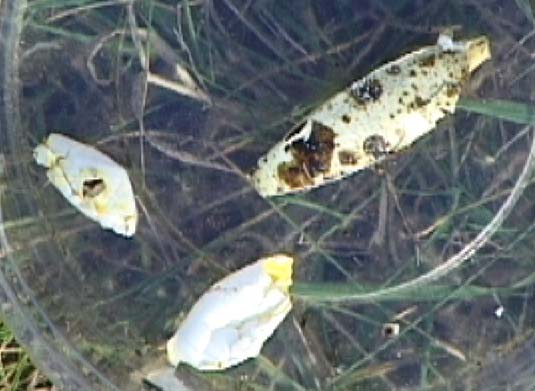
and coming back well as one can see from the nicely parcelled shells. 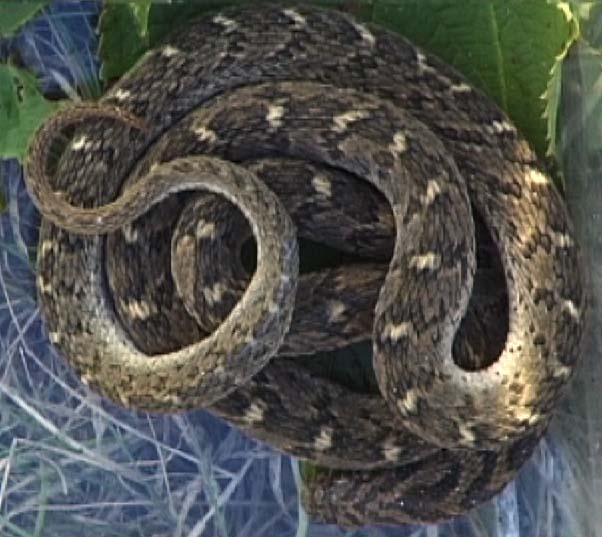
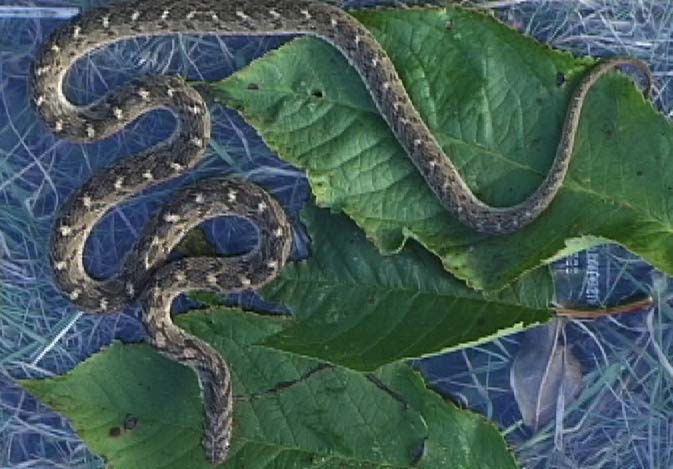
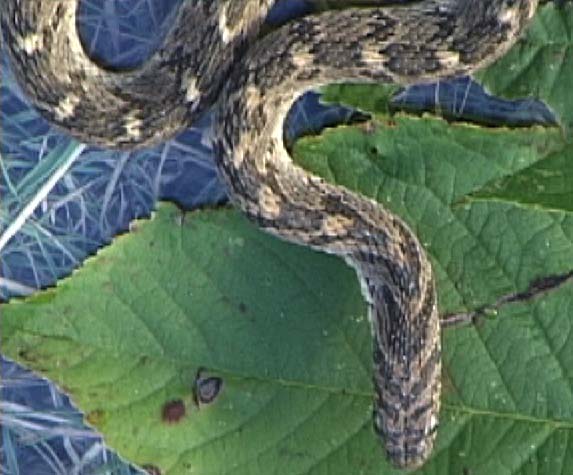
If you look closely you can see small white particles on the head and some of the scales, these are snake mite droppings which the snake has a lot of, I will try to get rid of these after another meal. British Herpetological Society Librarian and member of B.H.S Conservation Committee. Self employed Herpetological Consultant and Field Worker. |
|
Egg-eater Member Joined: 14 Oct 2003 No. of posts: 2 View other posts by Egg-eater |
Posted: 23 Oct 2003 That's excellent news. Sounds like it was mighty hungry (they can go months without feeding and this one probably did). You are lucky to have a handy small egg supply too. I have since discovered that only D. scabra has a black mouth and heavily keeled scales, while medici does not, so scabra it is. The body/tail proportions and shape of tail suggest female to me. When she is bigger and mite-free, perhaps you might like to consider breeding from her. As I said, I have a lone male scabra and a friend of mine does too (his female escaped, but he is a long way from Southampton!). |
- Unidentified snake Quiz |